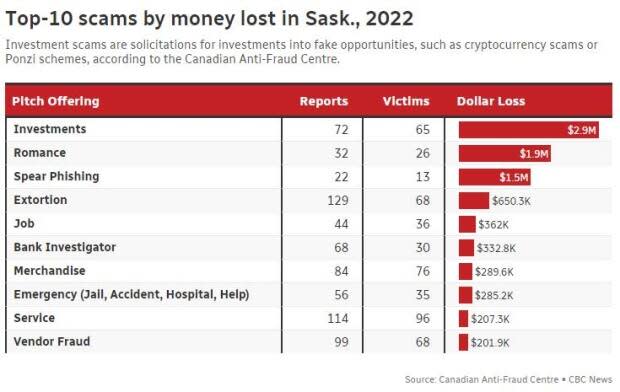Fraud losses in Sask. nearly doubled in 2022 to $9.3M, data shows

Raiza Ocampo was duped.
She was selling diapers she didn't need through Facebook Marketplace. A mother with young children wanted to buy them and sent the $18 she owed via e-transfer.
Ocampo, a Regina resident, received an email about the transfer, but the money didn't make it to her account.
"When I tried to message her about it, she blocked me," she said.
A screenshot of the email showed Interac logos, a reference number and links to various social media that, according to Ocampo, worked when clicked on. The word 'deposited' was misspelled in the subject line, however, with an extra 'd' at the end.

"Oh, this is what they're talking about," Ocampo recalled thinking at the time.
"I felt like a victim."
Fraud and scams turned a major profit throughout Canada last year, marking another record year in terms of money victims lost, according to data provided by the Canadian Anti-Fraud Centre.
Overall, more than $529 million was reported taken from about 37,000 people last year nationwide, data shows. Ontario was the province worst hit: about 11,110 people lost more than $213 million.
In Saskatchewan, the amount of money lost in 2022 nearly doubled from the previous year, despite a relatively small increase in the number of victims, data shows.
More than $9.3 million was taken from 790 victims in the province last year, compared to $4.8 million taken from 643 people in 2021.
Sask. fraud victims lost 6th-most money in Canada in 2022
About one in three victims in Saskatchewan last year were seniors. More than a third of the money lost — about $3.3 million — was taken from seniors, data shows.
"It's a little bit scary to see how significant the numbers are across provinces, specifically for Saskatchewan," said Natalia Stakhova, an associate professor of computer science at the University of Saskatchewan.
Scams are easy to pull due to technology, and people may turn to fraud during tough economic times, Stakhova said, so she isn't surprised that more money has been taken.
But the numbers suggest there is a lack of awareness about these schemes, she added.
Investment scams — solicitations for investments into fake opportunities, such as cryptocurrency or Ponzi schemes — were the most lucrative in Saskatchewan last year, generating more than $2.9 million from 65 people, data shows.

Personal information scams affected the most people, however.
These involve someone posing as a representative for an entity, urgently asking for personal information such as a name, address, account information or social insurance number. If provided, the scammer may use it for identity fraud, according to the anti-fraud centre's website.
No money was lost through those types of scams last year, data shows, but 121 Saskatchewan residents fell victim to them.
There were 292 identity fraud cases in Saskatchewan last year, data shows.
Only about five to 10 per cent of people report scams to the Canadian Anti-Fraud Centre, so the data likely only offers a glimpse of the true impact of this crime, said Jeff Horncastle, the centre's acting client and communications officer.
"It's scary," Horncastle said. "It just shows how much work we all have to do to try to educate each other."
The Canadian Radio-television and Telecommunications Commission (CRTC) also takes complaints about unsolicited calls.
Last year, it received about 39,900 complaints from across Canada, including 511 from Saskatchewan residents. The CRTC was able to link nearly two-thirds of the calls from Saskatchewan to a known scam or telemarketing campaign, according to data provided by a spokesperson.
Most calls from Saskatchewan, they said, related to scams involving impersonators from a bank, business or government agency; what are called Google listing scams that target small businesses; cryptocurrency investments; and telephone calls in Mandarin that target the Asian community.
Call volumes from Saskatchewan are lower compared to other provinces, because the province is unaffected by large telemarketing campaigns selling goods and services, such as duct cleaning, the spokesperson said.
Horncastle encourages people to educate themselves and others.
Ocampo, meanwhile, is still selling things through Facebook Marketplace — as she has for years.
But now her guard is up.


